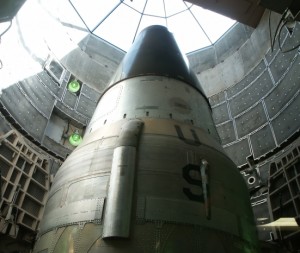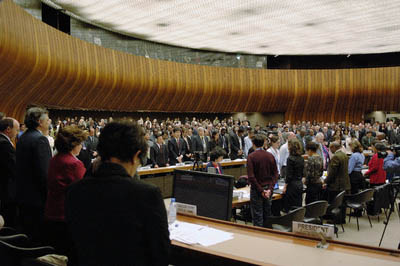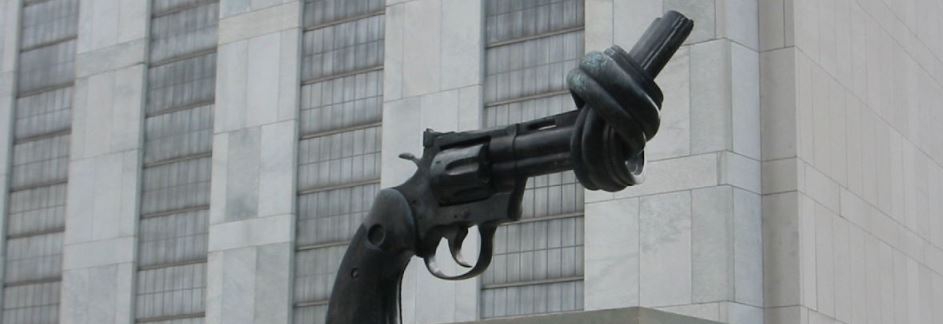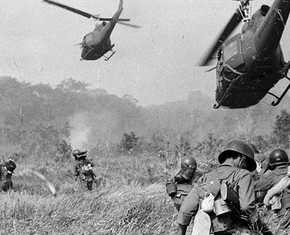The views expressed in our content reflect individual perspectives and do not represent the authoritative views of the Baha'i Faith.
World leaders have expressed grave concerns about North Korea’s nuclear test last week, as well as Iran’s ongoing development of its nuclear capabilities. Commentators say the prospect of either country obtaining deliverable nuclear warheads could de-stabilize the world’s 68-year-old nuclear cease-fire. Since the United States’ bombing of Japan ended World War II in 1945, no other country has used a nuclear warhead in anger – but nuclear weapons are slowly spreading to more countries, stockpiling potential threats to the world’s peace.
Just how many nuclear weapons exist? Experts usually cite the authoritative work of the Federation of American Scientists (www.fas.org). Here’s their most recent statement:

Titan missle in silo
“More than two decades after the Cold War ended, the world’s combined inventory of nuclear warheads remains at a very high level: more than 17,000. Of these, some 4,300 warheads are considered operational, of which about 1,800 US and Russian warheads are on high alert, ready for use on short notice.
Despite significant reductions in US, Russian, French and British nuclear forces compared with Cold War levels, all the nuclear weapon states continue to modernize their remaining nuclear forces and appear committed to retaining nuclear weapons for the indefinite future.”
In fact, at least nine of the world’s 206 countries now possess nuclear weapons: The United States, Russia, The United Kingdom, China, France, India, Pakistan, Israel and North Korea. Iran, even though it has officially denied any intent to develop nuclear weapons, is widely thought to be aspiring member number ten in the nuclear club.
Baha’is believe that the growing threat to the world’s peace and equilibrium these terrible weapons represent must be halted.
The clear, unequivocal Baha’i position on disarmament comes straight from the writings of its founder, most emphatically in the remarkable, historic Tablets Baha’u’llah wrote to the leaders of the world:
O rulers of the earth! Be reconciled among yourselves, that ye may need no more armaments save in a measure to safeguard your territories and dominions. Beware lest ye disregard the counsel of the All-Knowing, the Faithful. (Baha’u’llah, The Summons of the Lord of Hosts, p. 188)
From the inception of the Baha’i Faith in the middle of the 19th Century, Baha’u’llah repeatedly admonished the world’s leaders to disarm; and urged people everywhere to dedicate themselves to the twin causes of de-militarization and world unification. Because of this strong emphasis in the foundational teachings of the Faith, Baha’is have always worked for disarmament and peace. Baha’is and their communities were prominent participants in early League of Nations-sponsored disarmament efforts around the world in the 1930s, and in the post-World War II non-partisan Ban the Bomb movement. In fact, for the past 150 years, Baha’i peace activists worldwide have advocated global governance, disarmament and world unity. The democratically-elected worldwide Baha’i administrative body, The Universal House of Justice, has issued repeated statements urging nations and their leaders to continue and intensify the process of signing and carrying out disarmament and peace treaties. This deep commitment was directly encouraged a century ago by Abdu’l-Baha, when he spoke out about global disarmament in an interview with the Montreal Daily Star:
“As to the question of disarmament, all nations must disarm at the same time. It will not do at all, and it is not proposed, that some nations shall lay down their arms while others, their neighbours, remain armed. The peace of the world must be brought about by international agreement. All nations must agree to disarm simultaneously . . . In the meantime, all people of good-will must ever strive to make international peace the great issue. They must work unceasingly to turn public opinion in favour of this line of action.” (9/11/1911)
Abdu’l-Baha consistently repeated this theme in talks, books and letters, emphasizing the impact that dedicated peace advocates could have on positively influencing public opinion:
Now the question of disarmament must be put into practice by all the nations and not only by one or two. Consequently the advocates of Peace must strive day and night, so that the individuals of every country may become peace-loving, public opinion may gain a strong and permanent footing, and day by day the army of International Peace be increased, complete disarmament be realized and the Flag of Universal Conciliation be waving on the summit of the mountains of the earth. (Star of the West, vol. 5, no. 8 (August 1914), pp. 115)

Baha’is at the United Nations
As a result of this high level of activism, today Baha’is strongly support the United Nations’ efforts toward peace and disarmament:
It is noteworthy that the majority of the (world’s) nations have come into being during this century and that they have opted for peaceful relations with one another by joining in the membership of the United Nations and through participation in regional organizations that facilitate their working together. Moreover, the process of political unification is gaining acceleration through the awakening of a consciousness of peace among the world’s peoples that validates the work of the United Nations, and through advances in science and technology, which have already contracted and transformed the world into a single complex organism. (Baha’i International Community, 1999 Mar 20, Peace Among the Nations)
These continuing contributions to the UN’s mission of world peace and security all circle around Baha’u’llah’s primary message:
“The earth is but one country, and mankind its citizens.”
Baha’is don’t just want the world to simply disarm. We want it to do something much more profound – to unite.
















Comments
Sign in or create an account
Continue with Googleor